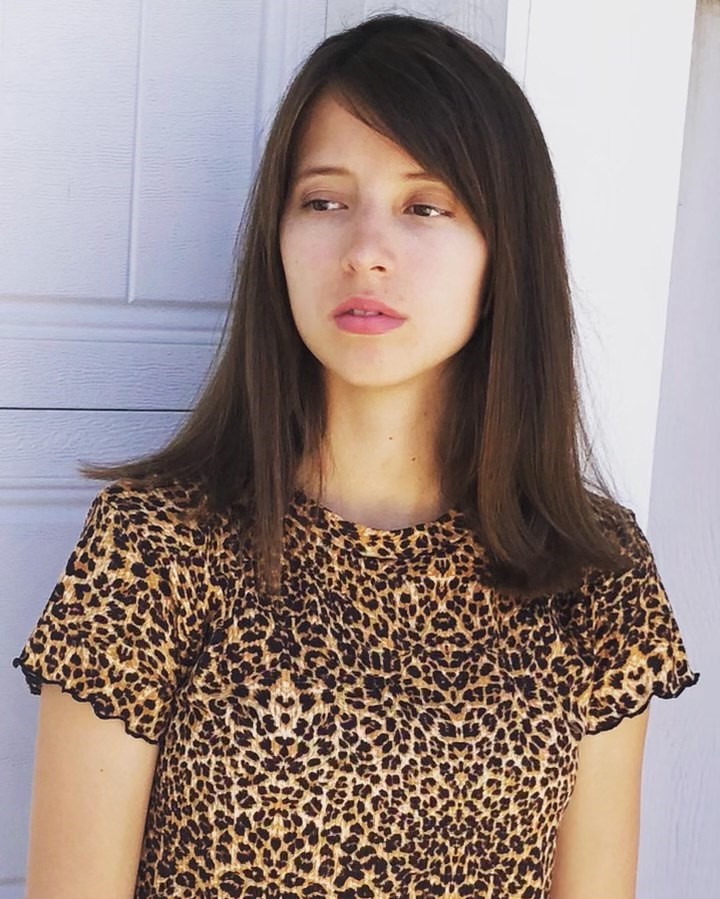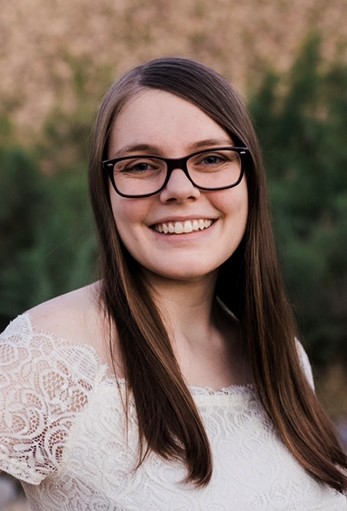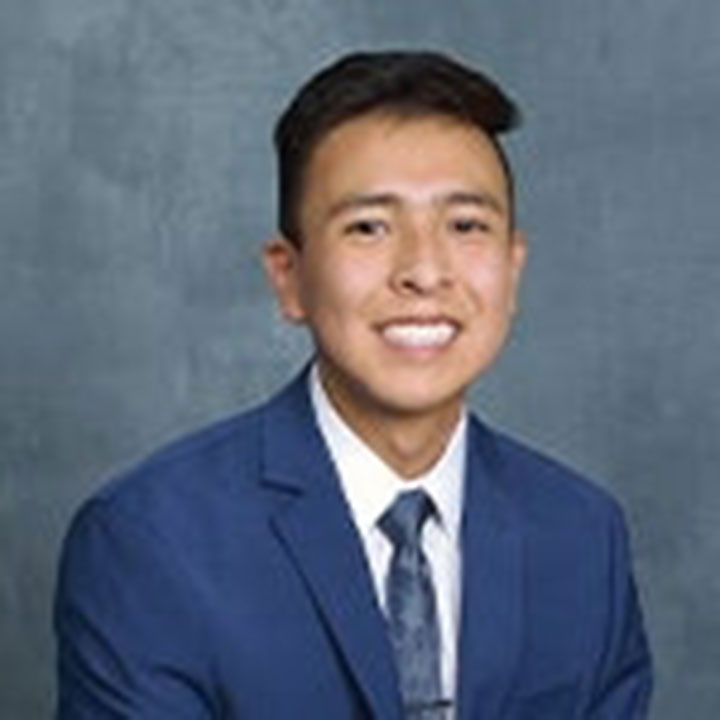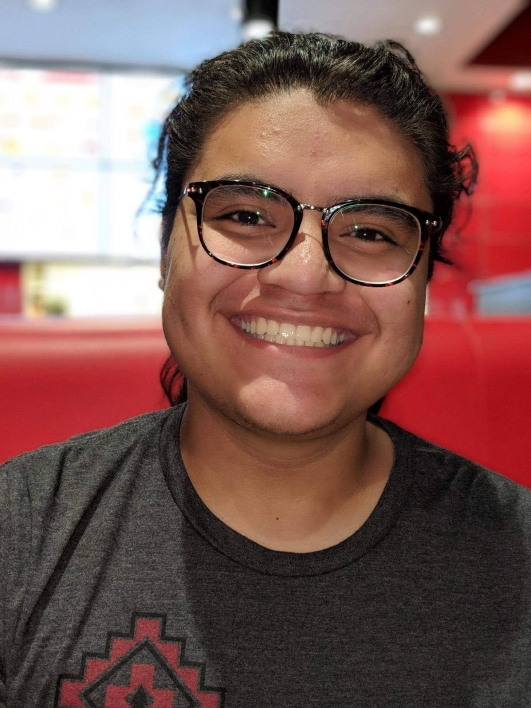4 ASU students nominated for Udall Undergraduate Scholarship

Photo by Deanna Dent/ASU
The Lorraine W. Frank Office of National Scholarships Advisement has announced that four Arizona State University students have been nominated for the Udall Undergraduate Scholarship, a major federal fellowship for college sophomores and juniors who demonstrate leadership, public service and commitment to issues related to Native American nations or to the environment.
The students are Nicole Kaiser, Katie Pascavis, Dylan Bia and Brian Forkum Jr.
Arizona roots
The Udall Scholarship is a program of the Udall Foundation, which was established by Congress in 1992 as an independent executive branch agency to honor Morris K. Udall's lasting impact on this nation's environment, public lands and natural resources, and his support of the rights and self-governance of American Indians and Alaska Natives. In 2009, the name of the foundation was amended to include Stewart L. Udall, who served as secretary of the Interior from 1961 to 1969.
“The Udall family’s deep roots in Arizona are part of what makes this award so meaningful to ASU students,” said Kyle Mox, associate dean for national scholarships. “And although the scholarship is offered to all students in the U.S., its core values align very well with the ASU Charter and our own core values.”
Investing in future leaders
The scholarship provides up to $7,000 for eligible academic expenses, access to the Udall Alumni Network and an invitation to a five-day Scholar Orientation in Tucson, where the incoming cohort of Udall Scholars participate in networking and professional development activities.
“The Udall orientation and the alumni network are really the most valuable parts of the scholarship,” Mox said. “Through these channels, the Udall Scholars can connect with other motivated, like-minded students from across the U.S. The experience helps to accelerate them towards their professional and personal aspirations.”
The award is open to full-time sophomores and juniors at any accredited academic institution in the United States. Students in any field of study may apply, and there is no minimum GPA requirement. Applicants also must be nominated by their institution. At ASU, the process is managed through the Office of National Scholarships Advisement, which organizes a faculty committee to review and approve applications for nomination.
“What I admire about the Udall Scholarship is how inclusive it is,” Mox said. “But what makes it special is its intense focus on three core values: civility, integrity and consensus. These are the values demonstrated by the Udalls in their public service careers, and I think we can all agree that they are qualities that we want to promote in the next generation of leaders.”
A community of support
To identify and then prepare likely candidates for the Udall Scholarship, the Office of National Scholarships Advisement collaborates with many units at ASU, including the School of Sustainability and American Indian Student Support Services.
“Without the support of our partners throughout ASU, we would not be as successful at identifying, encouraging and guiding strong candidates for the Udall Scholarship,” said Shay Masterson, program manager of outreach and inclusion with the Office of National Scholarships Advisement. “Faculty and staff with these units have been integral from the beginning of the application process through the end. Since they work so closely with the students in their respective units, they are able to connect (the office) with likely nominees, and often they go even further, providing one-on-one mentorship to applicants, as well as serving on the selection committees.”
This close collaboration between stakeholders has produced noteworthy results: Since the inception of the Udall Scholarship, ASU has been one of the most consistent producers of Udall Scholars in the U.S., with 31 recipients, behind only the University of Montana and Cornell University. Over the past decade, ASU has produced 12 Udall Scholars, second only to the University of Georgia. The most recent ASU recipients are Nathanial Ross in 2021 and Nekiyah Draper, Tahiry Langrand and Grant Real Bird in 2020.
Advisers in the Office of National Scholarships Advisement also can provide guidance on the Udall Foundation’s Native American Congressional Internship program, which provides American Indian and Alaska Native students with the opportunity to gain practical experience by serving in a congressional office. The program is open to undergraduates, graduate students and law school students.
Agents of change
Students pursuing the Udall Undergraduate Scholarship apply in one of two categories: environmental or tribal policy and Native health care. Applicants in the latter must be Native Americans or Alaska Natives. For the 2022 competition cycle, ASU has nominated two applicants in both categories.
Environment
Nicole Kaiser
Nicole Kaiser is a junior in the School of Life Sciences and Barrett, The Honors College. She graduated from Arcadia High School in Phoenix and studies biology, ecology and conservation.
In 2020, she received a Changemaker Grant to fund an initiative focused on improving biodiversity around Tempe Town Lake and spreading awareness about the need to conserve wildlife habitats in urban environments. Since winning the grant, Kaiser has collaborated with Tempe City Council and augmented reality company Hoverlay to raise awareness and increase the bat population in the area.
With the ASU Biodesign Center of Environmental Health Engineering, Kaiser assists with researching the dynamics of infectious diseases in order to promote public health knowledge and preparedness for future epidemics.
After completing studies at ASU, Kaiser plans to do further research abroad before pursuing a PhD with an emphasis on biodiverse systems. In the future, Kaiser hopes to conduct research that will influence policies and restore biodiversity in an ethical and inclusive manner.
Katie Pascavis
A junior from Gilbert, Arizona, Katie Pascavis is pursuing dual degrees in mechanical engineering and global health, with a minor in sustainability. She is a Flinn Scholar and a student at Barrett. She was also nominated for the Goldwater Scholarship this year.
Whether serving as president of Engineers Without Borders or working on projects with the Nanotechnology Enabled Water Treatment (NEWT) Engineering Research Center, Pascavis has proved committed to improving water, sanitation and hygiene (WASH) facilities around the world.
With NEWT, Pascavis has worked for the past three years on ways to eliminate bacteria in water, like the creation of the “Germicidal Jellyfish,” a floating device that emits bacteria-killing UV light.
During the pandemic, Pascavis put her commitment to public health and sustainability, combined with her engineering and research skills, to work with the Luminosity Lab at ASU. These efforts have led to new methods to sanitize masks, the design of N95 alternatives and PPE advising to local hospitals.
After completing her PhD in environmental engineering, Pascavis plans to become a university professor and establish a WASH lab to continue the type of work she has begun as an undergraduate.
Tribal public policy and Native health care
Dylan Bia
Dylan Bia, who received an honorable mention for the Udall Scholarship in 2020, is a member of the Leadership Scholarship Program at ASU and is both a Pat Tillman and Chief Manuelito scholar. Bia began the journey toward a career in health care by going through the medical assisting program at the East Valley Institute of Technology while finishing high school at Tempe Corona Del Sol.
At ASU, Bia is majoring in biological sciences with a concentration in neurobiology. In preparation for medical school, Bia also has participated in research at ASU-Banner, the University of Utah and the University of Arizona with various initiatives addressing Native American health issues.
In addition to his efforts relating to medicine, Bia serves the ASU community with roles in organizations such as Changemaker Central and the Alliance of Indigenous Peoples student coalition.
A member of the Navajo Nation, he intends to follow in the footsteps of his older brother and become a physician and work in rural, tribal communities to provide better access to quality health care.
Brian Forkum Jr.
Brian Forkum Jr. is a junior and Chief Manuelito Scholar and a Seciwa assistant with American Indian Student Support Services. Forkum graduated from Maricopa High School and is majoring in history.
Since starting at ASU, Forkum has become very active with the Alliance of Indigenous Peoples, One Native Nation and American Indian Student Support Services. As a SPIRIT Ambassador with American Indian Student Support Services, Forkum works to help incoming first-year students be successful at ASU.
Through the experience of listening to students from different tribes and regions of the U.S., Forkum came to realize some of the shared experiences of Native youth. This awareness set him on the path to dedicate his life and career to the Navajo Nation. He hopes to serve in tribal government, working to improve housing, promote mental and physical health, and preserve ancestral language and culture.
After completing his bachelor’s degree, Forkum will continue with graduate study at ASU to gain a more thorough understanding of the history and policies that have shaped the current issues facing Native Americans.
Applicants will be notified of their status in late April, with the official announcement of the next cohort of Udall Scholars being made by May 13.
Current ASU students who are interested in applying for the Udall Scholarship in a future cycle can visit onsa.asu.edu to schedule an advising meeting.
Story submitted by the Office of National Scholarships Advisement.
More Environment and sustainability

Arizona Water Innovation exhibit highlights 1,000 years of ingenuity, connection
In Arizona, water and innovation are inseparable. From the ancestral O’odham canal systems that carried water from the Salt…

How integrating nature can make cities more equitable
More than 80% of people on Earth now live in cities and towns, which means that urban areas have a huge role to play in solving…

ASU grad dedicated PhD to uncovering evolutionary relationships between their favorite creatures: Weevils
When Alexis Cortes Hernandez was an undergraduate student, they were determined to become a botanist. But then, they crossed…



